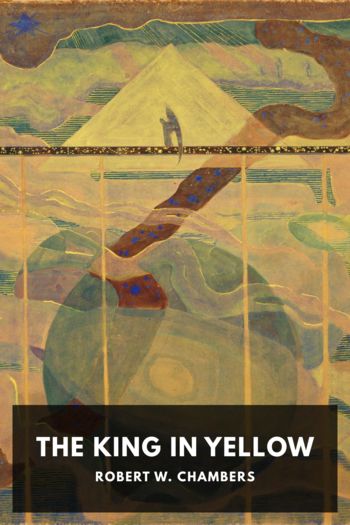The King in Yellow by Robert W. Chambers (best ereader for pdf and epub .txt) 📕

- Author: Robert W. Chambers
Book online «The King in Yellow by Robert W. Chambers (best ereader for pdf and epub .txt) 📕». Author Robert W. Chambers
It was four in the morning when he came out of the Prison of the Condemned with the Secretary of the American Legation. A knot of people had gathered around the American Minister’s carriage, which stood in front of the prison, the horses stamping and pawing in the icy street, the coachman huddled on the box, wrapped in furs. Southwark helped the Secretary into the carriage, and shook hands with Trent, thanking him for coming.
“How the scoundrel did stare,” he said; “your evidence was worse than a kick, but it saved his skin for the moment at least—and prevented complications.”
The Secretary sighed. “We have done our part. Now let them prove him a spy and we wash our hands of him. Jump in, Captain! Come along, Trent!”
“I have a word to say to Captain Southwark, I won’t detain him,” said Trent hastily, and dropping his voice, “Southwark, help me now. You know the story from the blackguard. You know the—the child is at his rooms. Get it, and take it to my own apartment, and if he is shot, I will provide a home for it.”
“I understand,” said the Captain gravely.
“Will you do this at once?”
“At once,” he replied.
Their hands met in a warm clasp, and then Captain Southwark climbed into the carriage, motioning Trent to follow; but he shook his head saying, “Goodbye!” and the carriage rolled away.
He watched the carriage to the end of the street, then started toward his own quarter, but after a step or two hesitated, stopped, and finally turned away in the opposite direction. Something—perhaps it was the sight of the prisoner he had so recently confronted—nauseated him. He felt the need of solitude and quiet to collect his thoughts. The events of the evening had shaken him terribly, but he would walk it off, forget, bury everything, and then go back to Sylvia. He started on swiftly, and for a time the bitter thoughts seemed to fade, but when he paused at last, breathless, under the Arc de Triomphe, the bitterness and the wretchedness of the whole thing—yes, of his whole misspent life came back with a pang. Then the face of the prisoner, stamped with the horrible grimace of fear, grew in the shadows before his eyes.
Sick at heart he wandered up and down under the great Arc, striving to occupy his mind, peering up at the sculptured cornices to read the names of the heroes and battles which he knew were engraved there, but always the ashen face of Hartman followed him, grinning with terror!—or was it terror?—was it not triumph?—At the thought he leaped like a man who feels a knife at his throat, but after a savage tramp around the square, came back again and sat down to battle with his misery.
The air was cold, but his cheeks were burning with angry shame. Shame? Why? Was it because he had married a girl whom chance had made a mother? Did he love her? Was this miserable bohemian existence, then, his end and aim in life? He turned his eyes upon the secrets of his heart, and read an evil story—the story of the past, and he covered his face for shame, while, keeping time to the dull pain throbbing in his head, his heart beat out the story for the future. Shame and disgrace.
Roused at last from a lethargy which had begun to numb the bitterness of his thoughts, he raised his head and looked about. A sudden fog had settled in the streets; the arches of the Arc were choked with it. He would go home. A great horror of being alone seized him. But he was not alone. The fog was peopled with phantoms. All around him in the mist they moved, drifting through the arches in lengthening lines, and vanished, while from the fog others rose up, swept past and were engulfed. He was not alone, for even at his side they crowded, touched him, swarmed before him, beside him, behind him, pressed him back, seized, and bore him with them through the mist. Down a dim avenue, through lanes and alleys white with fog, they moved, and if they spoke their voices were dull as the vapour which shrouded them. At last in front, a bank of masonry and earth cut by a massive iron barred gate towered up in the fog. Slowly and more slowly they glided, shoulder to shoulder and thigh to thigh. Then all movement ceased. A sudden breeze stirred the fog. It wavered and eddied. Objects became more distinct. A pallor crept above the horizon, touching the edges of the watery clouds, and drew dull sparks from a thousand bayonets. Bayonets—they were everywhere, cleaving the fog or flowing beneath it in rivers of steel. High on the wall of masonry and earth a great gun loomed, and around it figures moved in silhouettes. Below, a broad torrent of bayonets swept through the iron barred gateway, out into the shadowy plain. It became lighter. Faces grew more distinct among the marching masses and he recognized one.
“You, Philippe!”
The figure turned its head.
Trent cried, “Is there room for me?” but the other only waved his arm in a vague adieu and was gone with the rest. Presently the cavalry began to pass, squadron on squadron, crowding out into the darkness; then many cannon, then an ambulance, then again the endless lines of bayonets. Beside him a cuirassier sat on his steaming horse, and in





Comments (0)